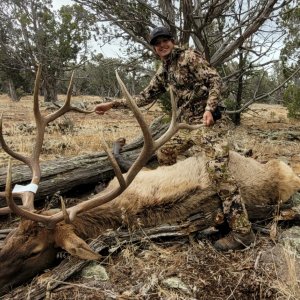I wanted to take some time today to debunk another myth put forth by the DWR. As a lawyer, the thing that bothers me most about the DWR's recent move to a formal RFP is the fact that they are violating their own administrative rule, which sets forth a process for awarding the five-year Expo Tag contracts. See R-657-55-4 (
http://www.rules.utah.gov/publicat/code/r657/r657-055.htm). Those of you who have taken the time to ask the DWR why they are not following their own rule have likley been told that the DWR recently realized that the process set forth in its own administrative rule was somehow inconsistent with a separate state procurement statute. As a lawyer, this makes little sense to me for the following reasons:
First, I don't believe there is any real conflict between the DWR's administrative rule and the procurement code. The fact is the DWR has relied upon the process set forth in its rule (which is already an informal RFP process) to award to two prior five-year contracts. If what they are saying is true then the DWR violated the state procurement code for 10 years. Why the sudden change now? What is the conflict? It makes no sense.
Second, assuming what the DWR is saying is true, there did not need to be any conflict between the DWR's administrative rule and the state procurement code. As you will recall, the DWR just amended its rule in January 2015. If the DWR wanted to change the process then it had a perfect opportunity to do so in the January 2015 rule amendment. All it had to do was remove the prior application process from the rule and spell out that the DWR would be issuing a formal RFP through the Division of Purchasing. If the DWR truly discussed all of this with several conservation groups in an informal meeting in October 2014, then there is no reason why they could not have incorporated the formal RFP process into the proposed rule amendment that went out to the RACs in December 2014 and the Wildlife Board in January 2015. In summary, there was absolutely no reason to have any conflict between the DWR's rule and some other supposed state statute. In essence, what the DWR is saying is "we created a conflict between our rule and another statute and now we are relying on that alleged conflict to violate our own rule."
Third, the DWR is ignoring the binding effect of their own administrative rules. The Utah Department of Administrative Services Division of Administrative Rules is the state agency that is responsible for publishing the administrative rules for every Utah state agency, including the DWR. On their website (
http://www.rules.utah.gov/abtrules.htm), they include a brief explanation as to the purpose of administrative rules. Take a minute and read it when you have a chance. It states the following:
"
DUAL PURPOSE OF ADMINISTRATIVE RULES
An administrative rule serves at least two purposes.
First, a properly enacted administrative rule has the binding effect of law. Therefore, a rule affects our lives as much as a statute passed by the legislature, restricting individuals AND the agency that issues it.
Second, an administrative rule is a messenger of sorts. It informs citizens of actions a state government agency will take or how a state agency will conduct its business. It provides citizens the opportunity to respond -- whether by providing public comment, or becoming involved in some other way."
That is the summary/explanation provided by the State of Utah. Those are their own words. That means that the application process set forth by the DWR in R657-55 has the "binding effect of law" just as much as some other statute passed by the legislature and it binds "the agency that issue[d] it." So much for the DWR's explanation that they suddenly became aware of some statute that requires them to violate their rule.
The second point is also critical. The DWR communicates with the public (and conservation groups) through its administrative rules. That is how the DWR informs the public (and conservation groups) as to how actions it "will take or how [it] will conduct its business." As I explained to the DWR, RMEF had no obligation to attend the DWR's private meeting in October 2014 and what may or may not have been "mentioned" at the meeting is completely irrelevant. RMEF also had no duty to inform the DWR that they might be interested in applying for the next Expo tag contract. The DWR was bound by the process set forth in its administrative rule and that is how the DWR is supposed to communicate with the public.
RMEF (and every other group) was perfectly entitled to rely on the process set forth by the DWR in its rule and it is ridiculous for the DWR to try to blame its repeated blunders on an alleged lack of communication within the RMEF. If the DWR wanted to change the process and move to a formal RFP process then they should have put it in their rule. The fact of the matter is the RMEF wanted to keep its interest in the expo tag contract a secret until the last possible minute because it was concerned about being treated fairly. Was that a valid concern? You tell me.
One other note, even after the DWR received RMEF's proposal on 9/1/2015 and realized that they had failed to properly spell out the process that they supposedly intended to use in their adminstrative rule, they chose to move forward and continue to violate their rule. The DWR could have stopped the preparation of the RFP and amended their rule to reflect what they were going to do. However, they were concerned that the public would have gone crazy and said that the DWR was merely changing its rule to authorize what it wanted to do -- which is true. But now the situation is even worse. Now, the DWR will have to go back and amend its rule to authorize what they have already done in violation of their rule. Once again, another major mistake by the DWR.
In summary, I still do not understand why the DWR thinks that it can simply ignore and violate its own administrative rule. Can you imagine of we all chose to ignore and violate the DWR's rules? Can the DWR expect us to respect and follow their rules when they don't?
If you have not contacted your legislative reps yet, please do so. The 2016 legislative session opens tomorrow. I would like to see the Utah Legislative Auditor take a look at the Expo Tag program and monies generated from those tags like he did with the wolf lobbying money provided to BGF back in 2013. See
http://le.utah.gov/audit/13_11rpt.pdf.
I will continue to address additional issues in subsequent posts.
-Hawkeye-












